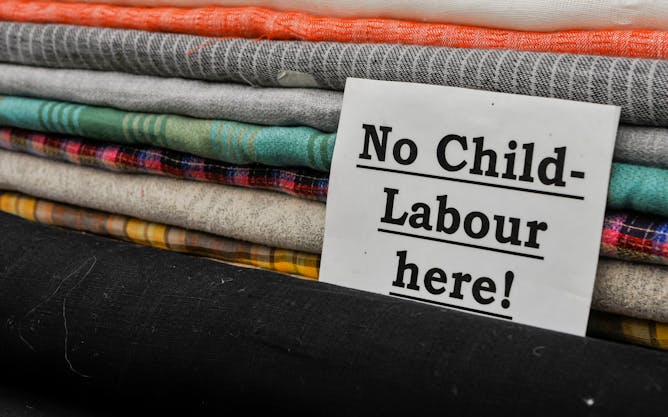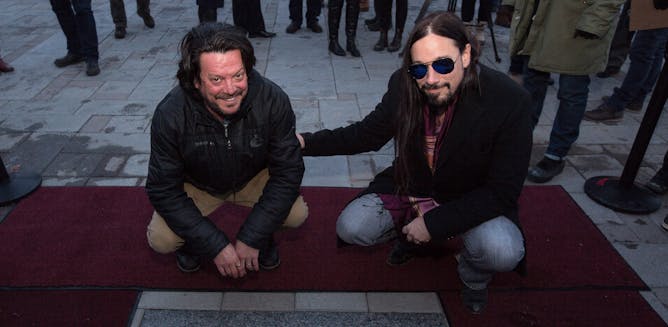|
|
|
|
The International Criminal Court has accused Russian leader Vladimir Putin of war crimes for deporting children from Ukraine to Russia amid the ongoing war between the two countries.
Today in The Conversation Canada, James Horncastle of Simon Fraser University delves into what the charges mean. Are they pointless, since Putin isn’t likely to ever face his day in court? Or do they have important symbolic value because they’re making clear that the world is watching Russian atrocities in Ukraine?
Horncastle examines the history of the International Criminal Court, including its sometimes strained relationship with the United States — and also points out how many other countries are accusing the court of hypocrisy because the types of crimes Putin’s accused of are happening in their own nations without any global repercussions.
Also today:
Regards,
|

|
Lee-Anne Goodman
Politics, Business + Economics Editor
|
|

A woman wrapped in the Ukrainian flag shouts through a megaphone during a demonstration in front of the International Criminal Court in The Hague, Netherlands, in March 2022.
(AP Photo/Phil Nijhuis)
James Horncastle, Simon Fraser University
The International Criminal Court’s charges against Vladimir Putin are likely to have a minimal impact on him, but it does signal that wartime atrocities have consequences — and the world is watching.
|

French lawmakers voted to require solar panel covers in most large parking lots.
Teamjackson via iStock/Getty Images Plus
Robert Lempert, Pardee RAND Graduate School; Elisabeth Gilmore, Carleton University
Two experts in policy and technology who were also co-authors of an international climate assessment see reasons for optimism.
|

Public Safety Minister Marco Mendicino speaks during a news conference on the government’s plan to enable expungements for convictions under the Criminal Code for bawdy house, indecency-based and abortion-related offences in Ottawa in March 2023.
THE CANADIAN PRESS/Justin Tang
Steven Maynard, Queen's University, Ontario; Gary Kinsman, Laurentian University; Patrizia Gentile, Carleton University; Tom Hooper, York University, Canada
Experts on the history of sexuality in Canada say recent changes to the Expungement Act don’t go far enough, and they urge Canadians to reject attempts to divide marginalized communities.
|

Forced labour, bonded labour and forced child labour affect millions of people worldwide.
(Shutterstock)
Stuart Milligan, Thompson Rivers University; Nancy Southin, Thompson Rivers University
While it may be challenging for organizations to manage all the activities within their global supply chains, there are best practices they can adopt to prevent modern slavery.
|

Perpetrators often utilize the numerous social media, messaging apps, games and forums available online to initiate contact with potential victims.
(Shutterstock)
Jan Kietzmann, University of Victoria; Dionysios Demetis, University of Hull
Many children and adolescents fall victim to online exploitation, but there are some steps parents can take to protect their children online.
|

Paul Langlois, left, and Rob Baker from the Tragically Hip help unveil a plaque at Springer Market Square in Kingston, Ont., in February 2017.
THE CANADIAN PRESS/Lars Hagberg
Robbie MacKay, Queen's University, Ontario; Lisa Macklem, Western University
There is a distinction between deliberate use of a song to support a particular political campaign, and incidental music in the background at a social function hosted by a political party.
|
La Conversation Canada
|

Il importe de comprendre pourquoi il est plus difficile de consulter, d'être consulté, et plus généralement, de communiquer en ligne sur les plateformes d'échanges.
(Shutterstock)
Justine Lalande, Université du Québec à Montréal (UQAM); Hugo Mimee, Université du Québec à Montréal (UQAM); Stéphanie Yates, Université du Québec à Montréal (UQAM)
Au-delà des considérations techniques et des difficultés technologiques, l’humain devant la caméra vit une expérience différente, ce qui amène certains défis.
|
Education
|
-
Bridget Retzloff, University of Dayton; Katy Kelly, University of Dayton
Here are some of the pros and cons to college students using Wikipedia in their research and assignments.
|
|
Health
|
-
Samuel J. White, Nottingham Trent University; Philippe B. Wilson, Nottingham Trent University
Air pollution can increase COVID risk by weakening our immune defences and exacerbating underlying health conditions.
|
|
Politics
|
-
Shelley Inglis, University of Dayton
When former President Donald Trump summoned his fans to protest over what he called his imminent indictment, a scholar of democracy saw it as an autocratic move.
|
|
|
|
| |
| |
| |

|
| |
| |
| |
| |
| |
| |
|
|
|
|
|
|
|